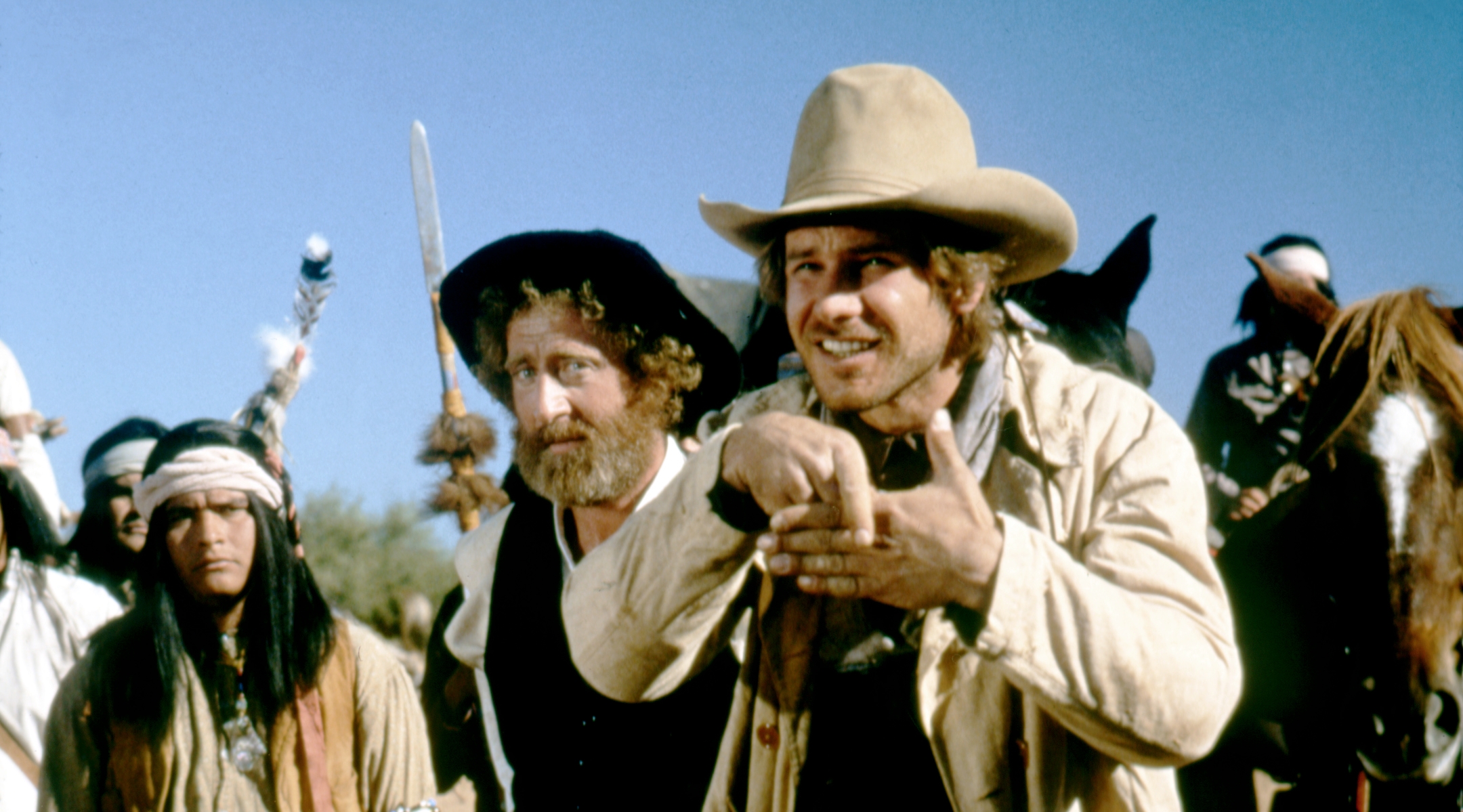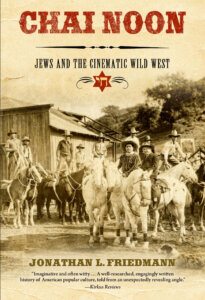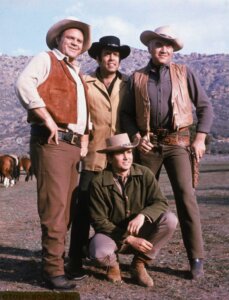How Jews shaped the Western — and how the Western shaped Jews
In ‘Chai Noon,’ Jonathan Friedmann explores the Jewish history of Westerns, on and off screen.

Gene Wilder, center, plays a Polish rabbi in the 1979 film The Frisco Kid, alongside Harrison Ford. Photo by Sunset Boulevard/Corbis via Getty Images
When you think about Jewish contributions to the world of entertainment, your mind probably immediately goes to comedies, sci-fi and musicals. But there’s another genre rich with Jewish history: Westerns.
In Chai Noon: Jews and the Cinematic Wild West, scholar Jonathan Friedmann examines Jewish figures and themes in Western film and television, dating all the way back to Hollywood’s first feature-length film. The Squaw Man, released in 1914, was co-produced by Jesse L. Lasky and his brother-in-law Samuel Goldwyn, both Jews who became major forces at Paramount Pictures. The director of the film, Cecil B. DeMille, also had matrilineal Jewish heritage, although he was raised Episcopalian.
Friedmann writes that some early Jewish Hollywood executives saw their own story reflected in cowboy mythology: the scrappy perseverance of an individual going to a strange world out west to build a new life for themselves, whether they had come from Europe to America or they had left the urban streets of Lower Manhattan for the Hollywood Hills.

Jews played a prominent role in Westerns not just as producers and directors but also as writers, composers and actors. More rarely, there were explicitly Jewish characters, such as the wistful peddler in Yiddisher Cowboy and Gene Wilder’s westward bound rabbi in The Frisco Kid.
Non-Jews and urban Jews alike thought the solitary and rural cowboy lifestyle was incompatible with Judaism’s communal ways of life.
In early 20th century vaudeville routines, Jews in Eastern cities would sometimes mock the idea of a Jewish cowboy. These shows often centered on a stereotypically clumsy and cowardly peddler, dressed in traditional Jewish garb, struggling to survive in the desert among masculine, gun-slinging cowboys. Friedmann says this stereotype often made its way into the rare Western films and television episodes that featured Jewish characters.
While it was true that Jewish peddlers were prominent pioneers, Friedmann asserts that they had often adapted to the Western lifestyle and weren’t the helpless misfits the media portrayed them to be. This was in part because Jews who went west were part of a different wave of immigration than the Eastern European Jews who immigrated to New York in the 20th century.
“Roughly 1820 to the mid-1800s, that was more Central European Jews from what would become Germany, parts of France, and so forth,” Friedmann told me in an interview. He explained that these groups were “more acculturated Jews who were more lenient in terms of preserving the past and even weren’t as observant in many cases even before they came over. So they blended in really well.”
Despite this fact, episodes of Have Gun–Will Travel and Bonanza depict Western Jews – especially older men – as resistant to the ways of the new frontier. Although the portrayals were ahistorical, Friedmann argued that Jewish writers did not often intend for the portrayals to be malicious.
“The desire of the time of these television writers who were Jewish [was] to kind of show that Jews were there, too, in the American mythology,” Friedmann pointed out. “And also to show viewers both Jewish a little bit of pride, that we have representation, and then [to show] non-Jews like ‘Jews aren’t so different and maybe you should appreciate your Jewish neighbors a little bit more because they were very instructive and very helpful to the cowboys.’”

Between the 1930s and 1950s, Westerns comprised between 20-30% of annual film releases in the U.S., but towards the middle of the 20th century, their popularity started to decline. Between 1970 and 1980, there was an 80% drop in the production of Westerns. Friedmann noted that in the 21st century, there have been more academic books published on Westerns than new Western films released.
This is in part, Friedmann said, due to the outdated tropes about race and gender that defined the genre for many years. Additionally, the social and political unrest of the 60s and 70s left the public with less of an appetite for Westerns’ unnuanced portrayals of good and evil. But Friedmann says there’s still value in studying these films, even if they don’t align with modern values.
“If we have hang-ups like that, then I think we lose sight of even the progression of culture which is mapped out very beautifully in these films,” Friedmann explained. “In the Cold War period versus the Vietnam War period versus the more postmodern sort of iterations, you see how the films are reacting to things in the culture and sort of reading it back into the Western milieu in a way that’s actually quite interesting.”
In the second half of the 20th century, the anti-Western – also known as the revisionist Western – movement birthed films that responded to new socio-political realities. The 1970 film There Was a Crooked Man…, helmed by legendary Jewish director Joseph Mankiewicz and starring Jewish actor Kirk Douglas, disrupts the myth of the invincible Western lawman and criticizes its antagonists’ racism. The Coen brothers’ True Grit centers on a clumsy, drunkard U.S. marshal, undercutting the trope of the morally pure and physically intimidating cowboy protagonist.
Today, Friedmann said, the Western is a niche genre.
“I don’t know if the Western is poised for a comeback in any way,” Friedmann admitted. “But, if it is, I think there are a lot of opportunities for Jewish stories in there.”
The book Chai Noon: Jews and the Cinematic Wild West will be published on June 3, 2025 by the University of Wisconsin Press.
Correction: An earlier version of this article misattributed the photo of Carl Laemmle. It was provided by the Western States Jewish History Association, not Elvia Friedmann.

















